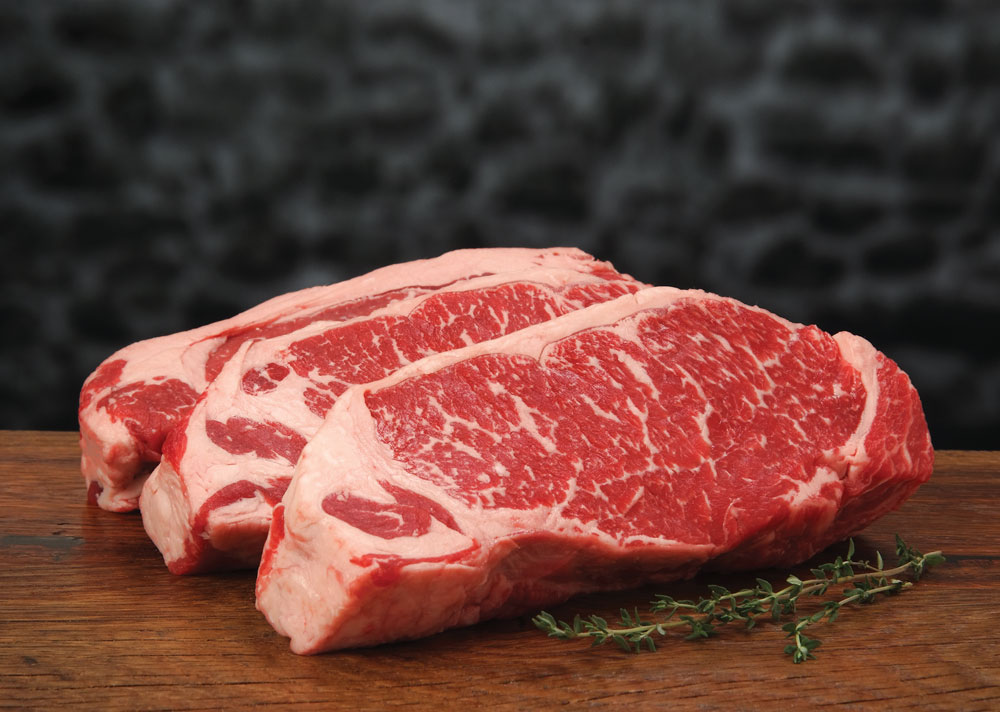
Given tenderness, marbling is key
by Katy Kemp
The study of why we eat beef keeps pointing past tenderness. Given only certified tender strip steaks that varied in marbling and juiciness, a carefully chosen panel of 120 consumers said flavor is where it’s at.
Sensory evaluation research, as part of a joint project among Texas Tech, Utah State and Mississippi State universities, scored the strip-loin steaks to get at the role of taste fat in consumer appeal.
Mark Miller, the San Antonio Stock Show and Rodeo distinguished chair in meat science at Texas Tech, helped conduct the recent study published in Meat Science last fall titled, “Sensory evaluation of tender beef strip loin steaks of varying marbling levels and quality treatments.”
Since the mid-1980s, the beef industry has worked to improve overall tenderness, Miller says. Now that the 2010 National Beef Tenderness Survey found no toughness issue with 94% of rib and loin cuts, the focus rightly moves to other factors.
“We have the previous data that suggests tenderness, flavor and juiciness all affect palatability,” he says. “The data suggested flavor was important but no study had isolated that component by leveling the tenderness in the samples. As the product is getting more tender, we wanted to know what are the primary drivers for consumer eating satisfaction.”
The study evaluated consumers who were the regular purchasers of beef in their families and ate beef one to three times per week. Most of them named tenderness as the top palatability trait, followed by flavor, but when it came to this test among equally tender steaks, most ranked flavor at the top.
Participants were provided samples of 10 strip-loin steaks meeting Warner-Bratzler shear force (WBSF) criteria for the USDA “Certified Very Tender” claim to minimize any halo effect of tenderness in the evaluation.
Steaks in the study included: Australian Wagyu (AUWA) – finished on a barley ration, American Wagyu (AMWA) – finished on corn ration, USDA Prime, USDA High Choice, USDA Top Choice-Holstein, USDA Low Choice, New Zealand grass-finished (GR), USDA Select-Holstein, USDA Select and USDA Standard.

“Flavor is magnified when tenderness is acceptable,” Miller says. “When juiciness and tenderness factors are met, the evaluation of that steak goes to flavor, so that’s why the focus of the evaluation is amplified, because we are more or less meeting the other two criteria.”
Because consumers perceive tenderness differences with variations in marbling, some halo effect was unavoidable. For example, the panelists found no difference in tenderness among the three steak samples with the highest fat levels (AUWA, AMWA, and Prime), which also received their highest palatability rankings.
However, the panel noted Standard, GR and Select steaks at the bottom for tenderness.
Juiciness and flavor liking ratings were positively associated with fat content, higher with increased marbling. GR samples were rated lowest for overall palatability of the grilled strip loin steaks, just below Standard.
Asked to rate overall acceptability for tenderness, juiciness, flavor and overall liking, consumers preferred Prime at 92.92%, followed closely by High Choice at 92.34%, compared to Standard at 61.16%. High Choice represents the marbling level required to meet Certified Angus Beef ® (CAB®) brand acceptance.
Since panelists did not know actual grade or quality levels in the study, their perceptions were all that ranked 40% of Standard steaks as unsatisfactory for quality, compared to just 6.67% unsatisfactory for Prime samples.
Asked to rate each sample for its ability to meet or exceed “good everyday quality, better than everyday quality and premium quality,” the higher fat (marbling) steaks were named to that premium category more often than all other samples. While 50% rated High Choice as good for everyday quality eating, nearly another 40% called it better than that for a total 89.17% satisfactory.

The consumer panel results are “pretty significant” in pointing out the importance of marbling today, says Mark McCully, CAB vice president for production.
“With the product getting more tender through genetic selection, we need to look at the primary drivers of consumer eating satisfaction,” he says. “A tough steak is hard to sell—that trumps everything—but once it’s deemed tender, juiciness and flavor matter the most, so marbling matters.”
That’s not to say we can ignore tenderness now.
“We shouldn’t be comfortable with a near 7% failure rate,” McCully says. “Considering environments, 93% is pretty good for where we are, but also leaves room for improvement.”
Given today’s beef prices, asking consumers to pay more for a steak they might find unsatisfactory doesn’t suit Miller or McCully. For consumers to suggest a Select steak from the loin is unsatisfactory up to 34% of the time means a lot of risk for beef consumption, McCully says.
To keep growing beef demand, producers must think about the steak on the plate, and marbling contributes to that appeal, he says. Placing selection pressure on quality is a logical way to respond to the market signals consumers are sending.
Miller agrees: “If we are going to ask consumers to pay current prices, or more, it’s going to have to eat really well, consistently. There is no room for error if you consider the price of competing proteins.”
The full paper is available at www.cabcattle.com/research.
You may also like
$100,000 Up for Grabs with 2024 Colvin Scholarships
Certified Angus Beef is offering $100,000 in scholarships for agricultural college students through the 2024 Colvin Scholarship Fund. Aspiring students passionate about agriculture and innovation, who live in the U.S. or Canada, are encouraged to apply before the April 30 deadline. With the Colvin Scholarship Fund honoring Louis M. “Mick” Colvin’s legacy, Certified Angus Beef continues its commitment to cultivating future leaders in the beef industry.
Raised with Respect™ Cattle Care Campaign Launched This Fall
Raised with Respect™ was developed as part of a strategic cattle care partnership between Sysco and CAB. The collaboration focuses on supporting farmers and ranchers, equipping them with continuing education to stay current on best management practices and helping to increase consumer confidence in beef production.
Quality Wins, Again
Sara Scott, Vice President of Foodservice for Certified Angus Beef, emphasizes the importance of taste over price in the beef market during the Feeding Quality Forum. As consumer demand for high-quality beef grows, Scott highlights the need for increased supply and encourages communication with packer partners to meet the demand for Prime beef.



